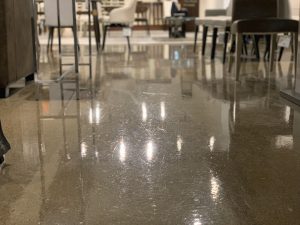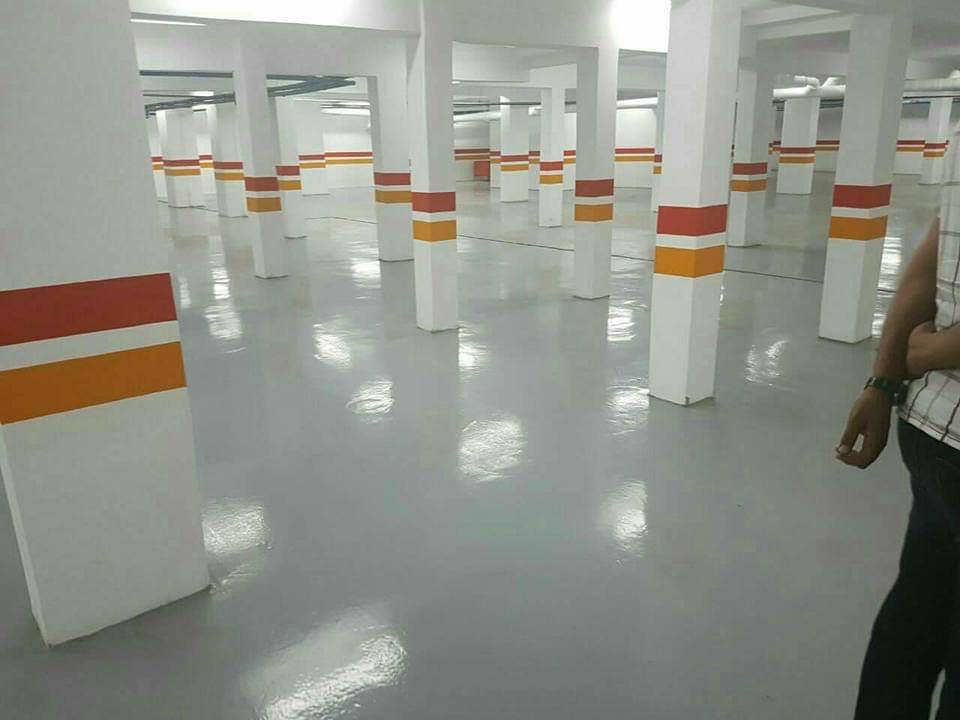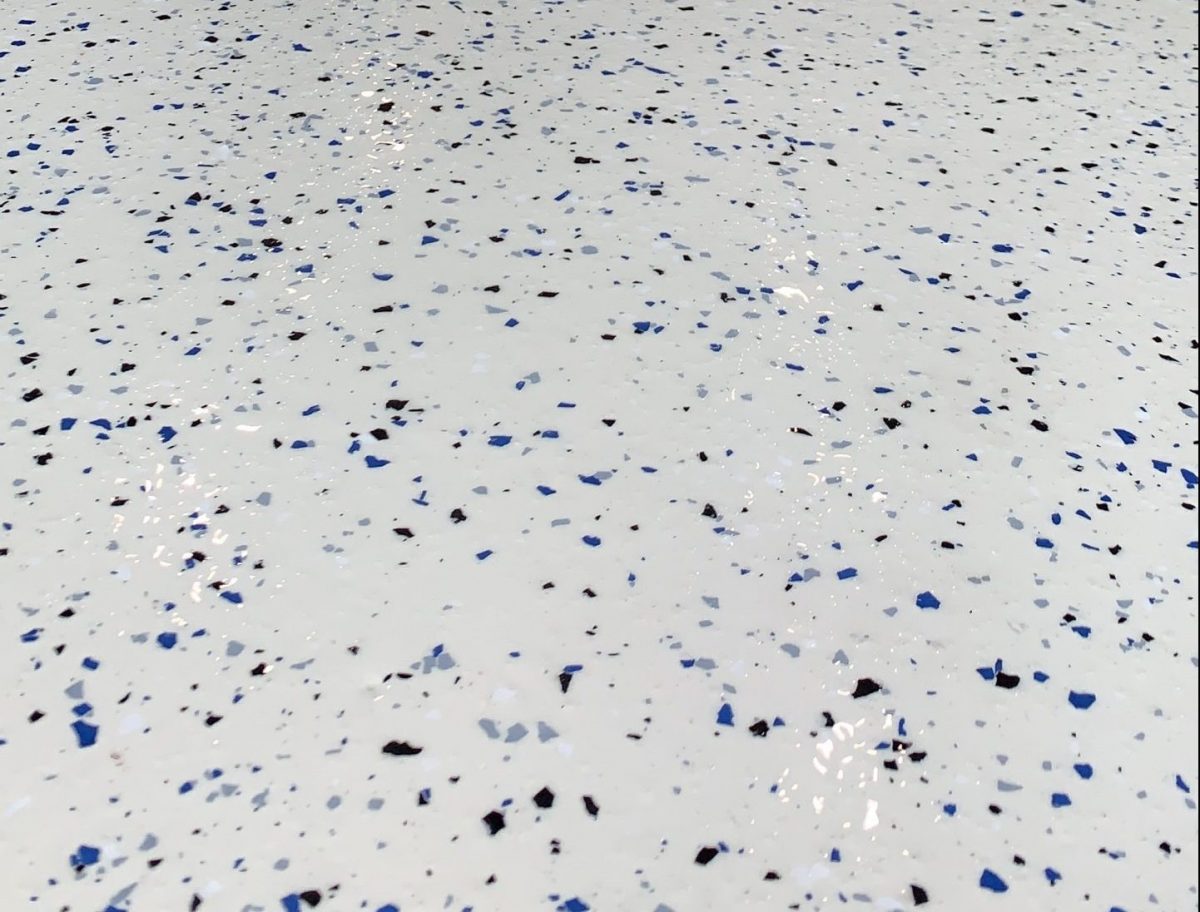epoxy flooring cost per Square foot for the GTA area in 2025
The cost of epoxy flooring per square foot depends on many factors, including the condition of the concrete floors, the thickness of epoxy floor coating, the number of layers, and the type of epoxy floor finish required. Epoxy concrete floor coating cost varies based on the setting; for example, residential jobs typically cost more per square foot than commercial and industrial applications. This difference is due to factors like job size and accessibility. It may require more prep work than a newly finished concrete with no coating, an open area generally requires less labour.
For instance, residential garage epoxy flooring will cost between $5.99 to $12.99 per square foot + tax, and larger commercial jobs over 1500 ft.² will cost between $1.99 – $8.99 per square foot plus tax, depending on the systems and epoxy floor design colours used. To determine the specific cost for your commercial or residential flooring, it is recommended to consult with professional epoxy flooring contractors or floor coatings suppliers in the GTA. They can assess your facility’s unique requirements and provide tailored quotations, helping to ensure that your investment in epoxy flooring aligns with the long-term needs and goals of your industrial operations.
If you’re considering finishing the floors of your garage or commercial space, epoxy flooring is likely one of the top contenders on your list. Epoxy flooring offers a range of benefits, from its durability and longevity to its seamless finish and low maintenance requirements. It’s important to understand what to expect. By revealing the epoxy flooring cost per square foot, we’ll help you determine if this is the right choice for your project. Whether you’re considering epoxy flooring for your residential or commercial space, understanding the cost per square foot will enable you to create an accurate budget and ensure you receive the best value for your investment. So, let’s dive in and explore the true cost of epoxy flooring per square foot.


Epoxy flooring
When considering the cost of epoxy flooring for an industrial floor, it’s important to remember that while the initial investment may be higher than other flooring options, epoxy floors are known for their durability and long-term cost-effectiveness. They are resistant to stains, chemicals, and wear, which can result in lower maintenance and replacement costs over time. Furthermore, epoxy flooring can contribute to a safer work environment by providing enhanced traction and visibility, which can be beneficial in industrial settings.
What affects the cost of floor coatings:
1. The quality of epoxy floor coating
Every epoxy coating is not the same quality. The cost and quality of epoxy flooring can vary significantly based on several factors. The quality of an epoxy coating can be influenced by the type and grade of epoxy resin used, the hardener or curing agent, the manufacturer’s formulation and production process, as well as the expertise of the applicator.
2. Surface prep before installation of epoxy finish
The preparation of the surface is indeed crucial when it comes to applying epoxy flooring. Adequate surface preparation ensures proper adhesion of the epoxy to the substrate, which is essential for the longevity and performance of the flooring system. The first step in surface preparation is to clean the floor to remove any dirt, dust, grease, or other contaminants.
This can be costly if there is an existing epoxy coating, the removal of damaged existing floor coating will increase the epoxy flooring installation cost by 20%.
3. The condition of the concrete surface
The condition of the concrete surface impacts epoxy flooring cost. A rough surface requires more epoxy resin for a smooth finish.
4. Epoxy Flooring Design
The design of epoxy flooring plays a significant role in determining the overall cost of the floor coating. Various factors such as the complexity of the design, materials used, colours, and patterns can all influence the final price. It’s essential to consider these aspects when planning for epoxy flooring to align with your budget and aesthetic goals.


5. The size of the Area needs to be epoxied
The cost of epoxy flooring decreases for projects larger than 1500 ft.², potentially resulting in lower expenses for installation. Customers with three sets of double-car residential garages on the same street can benefit from a discount when getting their garage floors done with epoxy flooring at the same time.
6. Obstacles in the way of flooring application
When applying epoxy floor coating to an area with obstacles, such as mechanical rooms, shop floor manufacturing facilities, and a commercial warehouse full of shelving, the overall epoxy flooring cost will likely increase. Some epoxy flooring application jobs require a lot of hand work with brushes, reaching difficult-to-reach corners.
why hire a professional epoxy flooring contractor
Hiring a professional contractor for epoxy flooring can save you money in the long run for several key reasons:
- Expertise and Experience: Professionals have the training and experience to handle epoxy flooring properly. They understand the nuances of the materials and the application process, which minimizes the chances of mistakes that could lead to costly repairs.
- Quality Results: A skilled contractor will ensure a high-quality installation that is durable and long-lasting. This means you won’t have to worry about premature wear and tear or the need for frequent repairs, which can be expensive over time.
- Time Efficiency: A professional can complete the job much faster than a DIY approach, especially if you’re not familiar with epoxy flooring. This can save you money in terms of labor costs and the opportunity cost of your time.
- Proper Equipment: Professionals have the right tools and equipment to get the job done efficiently and effectively. If you attempt the project yourself, you may need to invest in equipment you’ll only use once, which is often not cost-effective.
- Warranty and Support: Many contractors offer warranties on their work, which can save you money if any issues arise after installation. If you do it yourself and run into problems, you’ll have to cover the costs of fixes on your own.
- Material Waste: A professional knows how to estimate the amount of epoxy needed, reducing waste. DIY projects often result in over-purchasing materials, which can add to overall costs.
In summary, while the initial expense of hiring a contractor may seem higher than undertaking the project yourself, the long-term savings from quality workmanship, efficiency, and reduced risk of issues make it a cost-effective choice. If you don’t have experience with epoxy flooring, it’s usually wise to leave it to the professionals.
